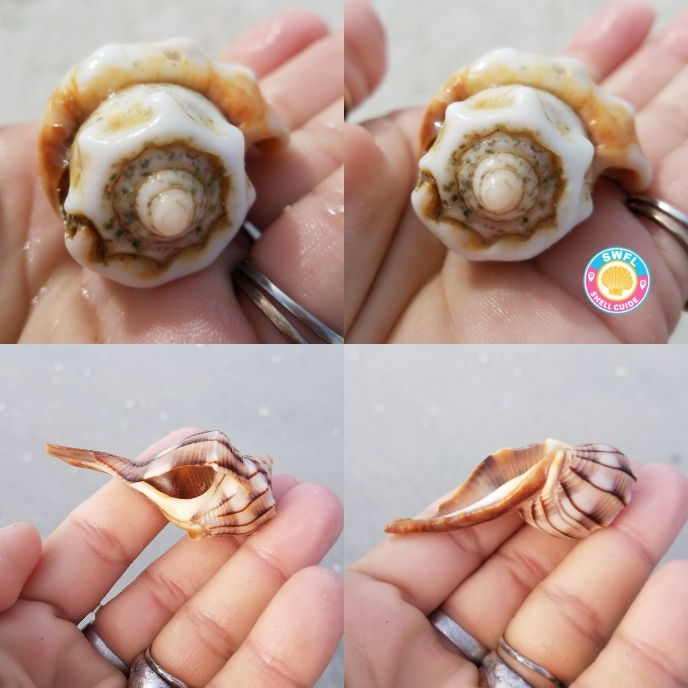Freak Shells: Nature’s Beautiful Bloopers
- May 21, 2025
- 3 min read
Updated: Aug 25, 2025

Why Freak Shells Are the Coolest Finds on the Beach
One of the most fascinating parts of shelling isn’t just finding something pretty, it’s finding something weird. We’re talking about those rare, head-scratching shells that look like nature threw the rulebook out the window. Around here, we call them freak shells.
These aren’t necessarily rare species. In fact, most freak shells start out as totally common varieties. What makes them special is what happened next, something went off-script. Maybe a predator took a bite, and the shell kept growing anyway. Maybe the mollusk had a genetic mutation, or the shell twisted into an odd shape thanks to environmental stress. The result is a one-of-a-kind natural sculpture.
What Counts as a Freak Shell?
A freak shell might have:
A twist or bulge in the wrong place
Unusual ridges or missing spines
Wild color patterns or partial albinism
A healed-over break or puncture wound
Instead of being “damaged,” these shells show survival, resilience, and adaptability. They tell a story. Each one is like a fingerprint: no two are ever the same.
Why Collectors Love Them
Seasoned shellers know: finding a freak shell is like finding a hidden treasure. They’re conversation starters. They stand out in any collection. And best of all, they’re reminders that imperfection can be beautiful.
So next time you're combing the beach or sifting through tidal debris, keep an eye out for the oddballs. That shell with the weird twist or scar? It might just be the coolest thing you find all day!
Here are a few of my favorite freak shells in my personal collection:
1. The Twisted Lightning Whelk:
- Species: Lightning Whelk
- Where I Found It: Washed ashore on Kice Island in 2020 after a windstorm.
- Why It’s Special: This whelk is a true oddity. Normally, whelks have a long straight siphon canal. My find, however, has a dramatic twist: its entire siphon canal is contorted into a tight twisty spiral, likely due to a growth abnormality caused by an injury or environmental stress. The shell’s twisted half looks like a twizzler. It’s a testament to nature’s ability to create art from adversity.

2. The Pointy Nutmeg:
- Species: Common Nutmeg
- Where I Found It: Half buried in muck near the shoreline on Kice Island in 2019.
- Why It’s Special: Nutmegs typically have an egg shape with whorls indented at the sutures. But this cutie has one large shouldered body whorl which gives its aperture a distinct pointed crease. This rare shape is likely a genetic mutation, making it a one-in-a-million find. The shell is otherwise flawless, but its distinct shoulder gives its aperture a point which sets it apart, almost looks the lovechild of a Nutmeg and a Whelk. It feels like I added an extraterrestrial to my shell collection!

3. The Ruffled Collar Fighting Conch:
- Species: Florida Fighting Conch
- Where I Found It: In a shell pile along with hundreds of other "normie" Florida Fighting Conch shells on shore on Kice Island in 2023.
- Why It’s Special: This conch shell is a remarkable survivor. He grew to the beat of his own drum! Conchs typically have blunt knobs on their shoulder whorls. But this treasure has a knobless entire upper shoulder which protrudes out like a thick rounded and flattened collar. The result is a shell with an almost ruffled, baroque appearance. It’s a reminder of the ocean’s challenges and the resilience of its creatures.

Tips for Finding Your Own Freak Shells
- Join a Tour: Book a spot on tour with SWFL Shell Guide to explore prime shell-hunting beaches. Reserve your spot now!
- Look Closely: Freak shells often blend in with common ones and hide in plain sight. Sometimes the quirk isn't readily apparent!
- Get to Know Your Shells: The more time you spend collecting and learning, the easier it becomes to recognize when something is truly unique. Once you know what a shell should look like, you’ll be better at spotting the oddballs!
Let’s shellebrate the quirky, beautiful imperfections of the sea together.
Happy shell hunting, and I hope to sea you on tour soon!
Honorable Mentions:





